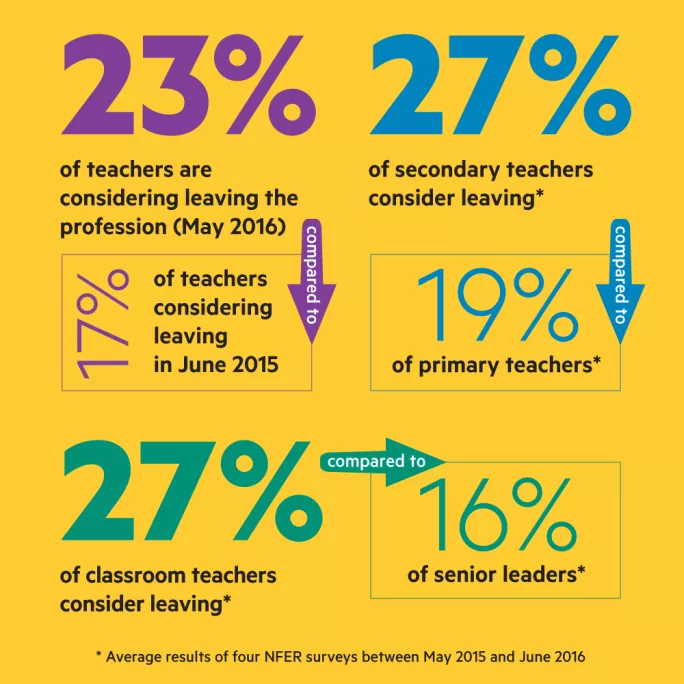Quarter of teachers want to leave the profession

The number of teachers considering leaving the profession has increased significantly over the last year, new research has found.
And less than half of state-school teachers are engaged in their role, while more than a third remain ambivalent, according to a report from the National Foundation for Educational Research (NFER).
Almost a quarter (23 per cent) of teachers were considering quitting teaching, compared to just 17 per cent in June 2015; the study, partly based on a poll of more than 2,000 teachers in England, found.
Meanwhile, the proportion of teachers who had identified an alternative to teaching doubled from summer 2015, from 6 per cent to 12 per cent.
Unions argue that the pace of policy reform during the academic year 2015/16 has played a major role in the rise of teachers seeking to leave by adding to an already significant workload.
Workload woes
The NFER, which carried out a series of surveys and interviews with teachers between June 2015 to May this year, recognises that “workload is at the centre” of why teachers consider leaving.
But the charity suggests keeping staff engaged can also help improve retention rates despite the pressures.
Job satisfaction, having adequate resources, reward and recognition, and being well supported by management were among the factors associated with successful retention in the research.
Science teachers and experienced male teachers are significantly more likely to consider leaving
The new report, Engaging Teachers - NFER Analysis of Teacher Retention, reveals a strong relationship between teacher engagement and their desire to leave. It found that 90 per cent of engaged teachers have no plans to leave, compared to just 26 per cent of disengaged teachers.
Maths teachers and senior leaders are less likely to consider leaving and are also more highly engaged, the report finds. But science teachers and experienced male teachers are significantly more likely to consider leaving, even after accounting for their relatively high level of engagement.
Teachers are ‘exhausted’
The research acknowledges that engaged teachers are not immune from considering leaving the profession.
A primary school teacher, who was interviewed as part of the study, said: “It’s not a decision against teaching, it’s a decision against working in this context […] the workload, the impact on my life.”
The report notes that the proportion of teachers who actually leave the profession, however, is smaller than those who intend to leave. But this is also increasing, according to the DfE School Workforce Census, which shows that the proportion of teachers leaving and not retiring has increased from 6 per cent in 2011 to 8 per cent in 2015.

Alison Ryan, a senior policy adviser at the ATL teaching union, said that the findings were worrying.
“Even if they haven’t left, that’s still an issue as they are demotivated and exhausted,” she said. “With pupil numbers going up, we cannot afford to go backwards.
“With workload, we have got to slow down the pace of change and we need the voice of the profession far more in any policies that are being brought into play. It feels like a treadmill that never quite gets better and never stops.”
‘Tangible change’ needed
A series of interviews that the NFER conducted with teachers suggested that inspection and policy changes had increased workload, while others said they didn’t feel valued for their efforts by government or school leaders.
Malcolm Trobe, the interim general secretary of the Association of School and College Leaders, told TES: “I don’t think it’s surprising that the retention rate is under pressure again. It is quite clear that with increased financial pressures on schools it’s increasingly difficult to manage the teacher workload.”
Chris Keates, general secretary of teaching union NASUWT, said: “These results show that the teacher supply crisis will continue to deepen unless the government gets a grip and makes some tangible changes to address the drivers of teachers’ deep concerns, including tackling the year-on-year cuts to pay and the excessive workload, which is blighting the profession.”
The Department for Education said that it recognised “challenges” facing teachers and was working to address concerns over workload and pupil behaviour.
You need a Tes subscription to read this article
Subscribe now to read this article and get other subscriber-only content:
- Unlimited access to all Tes magazine content
- Exclusive subscriber-only stories
- Award-winning email newsletters
Already a subscriber? Log in
You need a subscription to read this article
Subscribe now to read this article and get other subscriber-only content, including:
- Unlimited access to all Tes magazine content
- Exclusive subscriber-only stories
- Award-winning email newsletters